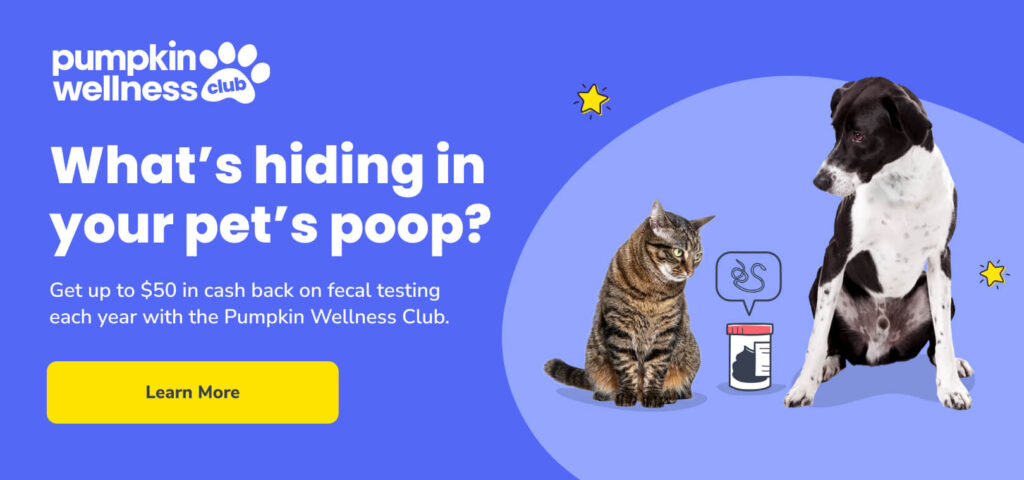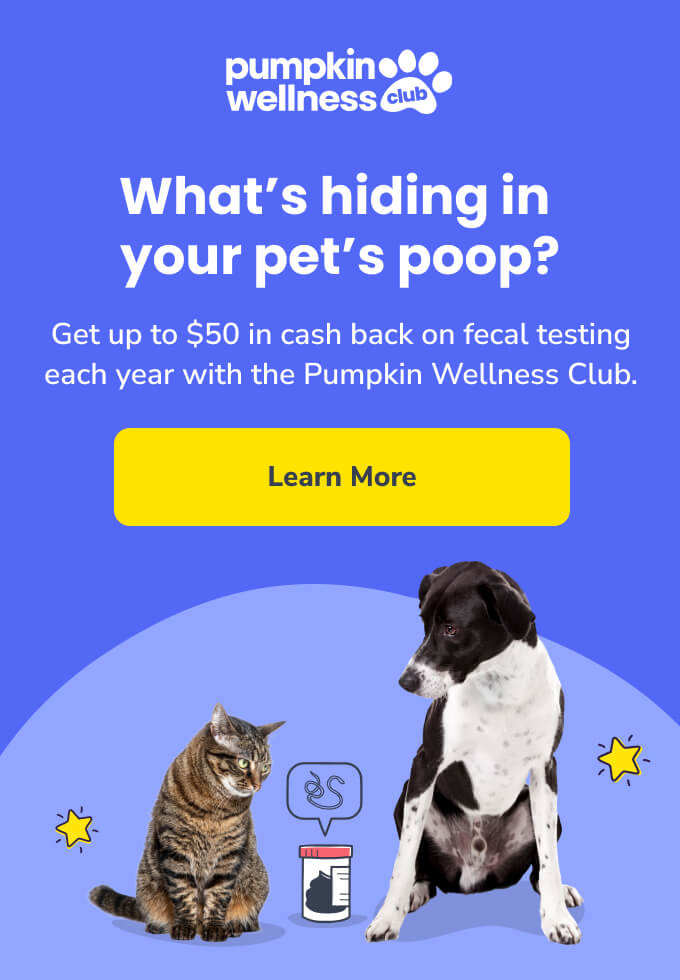Key Points
- Dogs can get hookworms, roundworms, and all sorts of intestinal parasites from other animals or contaminated soil.
- Puppies have a higher risk of getting sick from parasites, so it’s important to see a vet for deworming early in your dog’s life. Luckily, worm infestations are treatable and easily detected with regular fecal testing.
- What’s more, you can get paid $50 toward your dog’s yearly fecal exam and up to $650 per year on other preventive care with the Pumpkin Wellness Club*, a new program that helps you save on your pup’s routine health needs.
As a practicing small animal veterinarian for over 15 years, I have diagnosed and treated thousands of different conditions in dogs. I have seen everything from simple upper respiratory disease and intestinal blockages to skin disease and more.
With all these illnesses I have diagnosed and treated over the years, there’s one that always stands out and gives my pet owners the creeps.
Gastrointestinal parasites, AKA “worms.” The HORROR!
Especially practicing in South Florida, I see so many types of gastrointestinal parasites in dogs that they no longer faze me. But there is just something about the thought of worms living in a dog’s GI tract that elicits an emotional response from dog owners.
Since you’ve made it this far, let’s move past the gross-out factor and get to know four of the most common intestinal parasites that can end up in your dog. We’ll go over symptoms of worms in dogs, how to diagnose and treat these parasites, and most importantly, how to prevent your dog from getting worms in the first place. Let’s get started!
1. Hookworms

What are hookworms, and how does my dog become infected?
Hookworms are intestinal parasites that infect your dog’s intestinal tract by contact with or digestion of larvae (baby hookworms) in a contaminated environment. The parasite attaches to the lining of your dog’s intestinal tract and feeds on the blood of your dog.
These parasites then reproduce inside your pet’s intestinal tract and form eggs that are excreted through dog feces. The eggs hatch into young hookworms and live in the soil. Hookworm larvae can infect your dog through skin contact, ingestion of contaminated dirt or soil, or by licking their (potentially dirty) fur.
How will hookworms affect my dog?
Hookworm parasites feed on your dog’s blood, which results in blood loss and anemia. These parasites can be a serious threat to malnourished young puppies, who may not be able to survive the blood loss without a transfusion and extensive hospitalization.
In addition to blood loss, hookworms can cause diarrhea in dogs and puppies. In severe cases, infected dogs may also experience weight loss.
How does my dog get diagnosed with hookworms?
Hookworms in dogs are diagnosed with a routine fecal test. A veterinarian will examine a sample of dog feces under a microscope to check for hookworm eggs as well as hookworm antigen (a protein marker found on the surface of hookworms) to identify the parasite.
How do I treat hookworm parasites in my dog?
Fortunately, hookworms in dogs are easily treated. Hookworms are treated with a broad-spectrum anti-parasitic called Pyrantel Pamoate.
Speak with your veterinarian regarding the proper dosing protocol to treat hookworms.
Your veterinarian will also run a follow-up examination of your dog’s stool after deworming to ensure the parasites are gone.
Pet Pro Tip: New to puppy preventive care? Join the Pumpkin Wellness Club, a new program that actually pays you for providing your pup with the routine preventive care they need to stay healthy. Depending on your membership level, you can save up to $360 per year on veterinary services like fecal testing, annual wellness visits, flea & tick prevention, and discounts on top products your dog will love — plus access to a 24/7 Pet Health Helpline.
How do I prevent my dog from becoming infected with hookworms?
I always suggest puppies receive deworming medications for hookworms at 6-8 and 10-12 weeks of age. Puppies are at high risk for hookworm infection, and it is always best to routinely use a dewormer on them. Ensuring your pet’s surroundings are clean and free of contamination is another key step in preventing hookworm infection.
Many monthly heartworm preventives will also help prevent hookworm infection. Ask your veterinarian if your dog’s monthly heartworm prescription also protects against hookworm infestation.
Preventative treatment is always the best option, but it’s still important to have your dog checked for intestinal worms. Whether your dog is showing clinical signs of hookworms or not, it is important to have their stool sample tested twice a year for parasites. Routine tests are the easiest and most effective way to detect intestinal parasites early and treat or prevent infection.
Can humans become infected with hookworms?
These intestinal parasites are routinely found in adult dogs and cats and in kittens and puppies. They are passed into the environment through poop.
People can pick up these hookworms through their skin, most often from walking barefoot or playing outside. A young child may also accidentally eat worm eggs from a contaminated environment. Hookworm infections can cause painful and itchy skin infections or abdominal symptoms in humans, too.
2. Roundworms

What are roundworms, and how does my dog become infected?
Roundworm parasites are the most common parasite we diagnose and treat in dogs. Roundworms can get into a dog’s intestinal tract when a puppy drinks their mother’s milk or if a dog eats an infected animal, like a bug or rodent. Any contact with or digestion of larvae (baby roundworms) in a contaminated environment can contribute to the spread.
The parasite attaches to the lining of your dog’s intestinal tract and feeds on the blood of your dog. These parasites reproduce inside your pet’s intestinal tract and form eggs that are passed through dog feces. The eggs hatch into young roundworms and live in the soil, where they can then reinfect your dog via ingestion of contaminated dirt or soil.
How will roundworms affect my dog?
Many pets do not show signs of roundworm infection. Some dogs, especially young puppies, may experience diarrhea, vomiting, weight loss, a dull hair coat, and a pot-bellied appearance.
Roundworms can migrate into your dog’s lungs and may cause them to cough. You also may be able to see evidence of this parasite in your dog’s stool sample or vomit. Adult roundworms look like white or light brown strings that can be several inches long.
How does my dog get diagnosed with roundworms?
Roundworms in dogs are diagnosed with routine fecal testing. A veterinarian will inspect your dog’s stool sample under a microscope, checking for roundworm eggs as well as roundworm antigen. The presence of either indicates a positive infection.
How do I treat roundworms in my dog?
Fortunately, roundworms in dogs are easily treated. Like hookworms, roundworms are treated with a broad spectrum anti-parasitic called Pyrantel Pamoate. Speak with your veterinarian regarding the proper dosing protocol for treating different types of worms. Your veterinarian will run a follow-up fecal test after administering a full course of treatment to ensure the parasites are gone.
How do I prevent my dog from becoming infected with roundworms?
To prevent roundworm infection, ensure your pet’s surroundings are clean and free of contamination. Remove poop regularly from puppy crates, the yard, or wherever your dog goes #2. And if you can, don’t let your pup eat any furry critters they find outside!
I routinely deworm puppies at 6-8 and 10-12 weeks of age, as young puppies have the highest risk of roundworm infection. Many monthly heartworm preventives will also help prevent roundworm infection. Ask your veterinarian if your dog’s monthly heartworm prevention also protects against roundworms.
Routine fecal testing is the most effective way to detect roundworm infections. Whether your dog is showing clinical signs or not, bring a fecal sample to the vet for testing. This way, your veterinarian can detect any intestinal parasites early and quickly treat the infection.
Can humans become infected with roundworms?
These intestinal parasites are routinely found in adult dogs and cats, as well as young puppies and kittens. They are passed into the environment through your pet’s poop.
People can become infected by accidentally ingesting contaminated soil or feces. For example, a young child playing in a sandbox contaminated with worm eggs may put their unwashed hands in their mouth, unknowingly ingesting roundworm larvae. Roundworm infections can cause nerve or eye damage in some people, while others who are infected have no symptoms at all.
3. Whipworms

What are whipworms, and how does my dog become infected?
Whipworms are intestinal parasites that infect your dog’s intestinal tract by contact or digestion of whipworm larvae (baby whipworms) in a contaminated environment. These parasites reproduce inside your pet’s intestinal tract and form eggs that are passed through dog feces. Your dog can become infected by eating dirt or soil contaminated with whipworm eggs.
How will whipworms affect my dog?
Some dogs infected with whipworms show no signs at all. If infected, the most common clinical sign is bloody diarrhea. Severe whipworm infestation can result in serious disease or even death.
How does my dog get diagnosed with whipworms?
Whipworms in dogs are diagnosed with routine fecal testing. A veterinarian will examine your dog’s stool sample under a microscope for whipworm eggs as well as whipworm antigen (a protein marker found on the surface of whipworm parasites) to identify a positive infection.
How do I treat whipworms in my dog?
Fortunately, your veterinarian can easily treat whipworms in dogs. Whipworms are treated with a broad-spectrum anti-parasitic called Panacur (fenbendazole). Speak with your veterinarian regarding the proper dosing protocol to treat whipworms. Your veterinarian will run a follow-up fecal test after deworming to ensure the parasites are gone.
How do I prevent my dog from becoming infected with whipworms?
Ensuring your pet’s surroundings are clean and free of contamination is the first step in preventing a whipworm infection.
I always encourage dog owners to have puppies routinely examined at the 6-8 and 10-12 week marks to clear out any intestinal parasites, including whipworms.
As with other intestinal parasites, fecal testing is the best way to detect whipworm infections. Even in healthy dogs, regular fecal tests allow veterinarians to find intestinal parasites early.
4. Tapeworms

What are tapeworms, and how does my dog become infected?
Tapeworms are long, flat intestinal parasites that attach themselves to your dog’s intestines. Tapeworms consist of multiple segments (proglottids), each with their own reproductive organs — so a piece of a tapeworm can break off and multiply inside its host.
Dogs become infected by eating (or ingesting the blood of) another infected animal, known as the intermediate host. The intermediate host for a tapeworm can be as tiny as a flea or as large as a deer or sheep, depending on the species of tapeworm.
How will tapeworms affect my dog?
Dogs infected with tapeworms usually do not show signs of illness. However, finding tapeworms in your dog’s poop may spook a pet parent, which is usually how infected dogs end up in my waiting room.
How does my dog get diagnosed with tapeworms?
Most of the time, pet parents diagnose tapeworms themselves by finding segments (which appear as white specks that look like grains of rice or seeds) on the rear end of your dog, in dog feces, or where your dog lives and sleeps. You may also notice your dog exhibiting a scooting behavior.
Tapeworms in dogs can also be diagnosed with a routine fecal test. A veterinarian will examine a sample of your pet’s feces under a microscope for tapeworm eggs, segments, and tapeworm antigen to assess for infection. Identification of any of these signs indicates a positive infection.
How do I treat tapeworms in my dog?
Fortunately, tapeworms in dogs are easily treated. A one-time injection of praziquantel (another anti-parasitic) will resolve tapeworm infections. Your veterinarian will run a follow-up fecal test after the deworming medication has time to work to ensure the parasites are gone.
How do I prevent my dog from becoming infected with tapeworms?
Ensuring your pet is on an effective monthly flea prevention is essential in preventing tapeworm disease in dogs. Fleas are a common carrier of tapeworm larvae, so it’s imperative to keep your dog away from these intermediate hosts.
Many monthly heartworm preventives will also prevent tapeworm infection. Ask your veterinarian if your dog’s monthly heartworm prevention also protects against tapeworm infestation.
Whether your dog is showing clinical symptoms of a tapeworm infection or not, have their poop tested twice a year to detect intestinal parasites early and treat or prevent infection.
Can humans become infected with tapeworms?
Most human tapeworm infections come from eating contaminated meats. Humans can also get tapeworms by accidentally swallowing an infected flea.
The most common signs of a tapeworm infestation in a human are visible eggs, larvae, or tapeworm segments in poop; abdominal pain; vomiting; nausea; general weakness; inflammation of the intestines; diarrhea; and weight loss.
Final thoughts on preventing worms in dogs
Nothing is more terrifying to dog owners than learning that their beloved pup has worms. The thought of these pesky parasites wreaking havoc and feeding on our dogs is a scary one. However, gastrointestinal parasites are easily treatable with anti-parasitic medications, and you can detect them early with routine fecal testing.
Speak with your veterinarian about fecal testing at your next visit, or simply bring a fresh sample of your dog’s poop with you and let the experts handle the rest. You should also ask your vet about heartworm preventive medication, as these meds can also prevent common intestinal worms.
As a small animal vet, my number one goal is to make sure your pets are happy and healthy. If you ever have any questions or concerns about your pet, remember that your veterinarian is just as invested in your fur family’s health, and even more knowledgeable.
Pet Pro Tip: Preventive care is the backbone of any veterinary health plan, whether you have a tiny toy Poodle or a Great Dane at home. Consider joining the Pumpkin Wellness Club to save on the routine wellness care your pet needs on a year-to-year basis and access special discounts on top-dog products. Let the tail wagging commence!
DISCLOSURE






